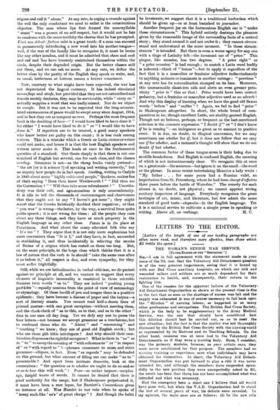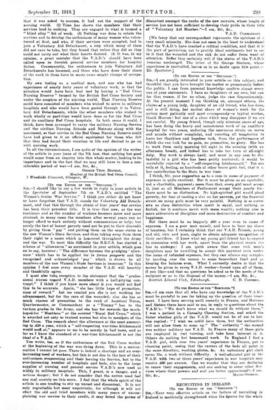LETTERS TO THE EDITOR.
[Letters of the length of one of our leading paragraphs are often more read, and therefore more effective, then those ushicJi fill treble the space.]
THE WOMAN'S SENIOR WAR SERVICE; [To smEnrres or TU1 " Sezerstoa."] • am in full agreement with the statement made in your
issue of the 7th inst. that the Voluntary Aid.Detachment,question is of the very greatest importance, seeing that it is bound up with our Red Cross auxiliary hospitals, on which our sick and wounded sailors and soldiers are so much dependent for their restoration to health, and, consequently, their return to the fighting One of the reasons for the apparent failure of the Voluntary. Aid Detachment Organisation as shown at the present time ie due to the fact that as soon as the shortage of nurses was felt and the supply was exhausted it wasof course necessary to fall back upon the " dilution " of nursing labour, as happened in so many other professions and occupations. The British Red Cress Society, which ja the body to be supplementary to the Army Medical Service, was the one that should have considered how this dilution should best be carried out, so as to meet the new situation; but the fact is that the matter was not thoroughly discussed by the British Red Cross Society with the nursing world as represented by its Matrons and its Teaching Schools. On the other hand, recourse was at once had to the Voluntary Aid Detachments, as if they were a nursing body, Here, I consider, was the primary mistake, because, ao your article says, they were never established for that purpose. The members had no nursing training or experience, save what individuals may have obtained for themselves. In short, the Voluntary Aid Detaoh- ment Organization was put forward to play a role it was never intended for, and although the members have responded splen- didly to the new position they were unexpectedly asked to fill, • the result has been that there has not been accomplished what was intended and what was necessary.
Had the emergency been a short one I believe that all would have gone well, but when the V.A.D. Organization had to stand the test of several sears of war, its defects were revealed. In my opinion, the main ones are as follows.: (1) In the new rot. that it was asked to assume, it had not the support of the nursing world. (2) Time has shown the members that their services lead to .nothing. They are engaged in what is termed a "blind alley ".bit of work. (2) Nothing was done to retain the services and to develop the enthusiasm of many women who volun- teered at first, and who, if their services were accepted, had to join a Voluntary Aid Detachment, a step which many of them did not care to take, but they found that unless they did so they could not carry out what their hearts desired. (4) It was, in my opinion, a great mistake that the V.A.D.'s should have been called upon to furnish general service members for hospital duties. Consequently, the enthusiasm to join Voluntary Aid Detachments has lessened, and those who have done their share of the work in them have in many cases sought change of occupa- tion.
My own feeling as a medical man, and one who has had experience of nearly forty years of vofuntary work, is that the situation would have been best met by having a "Red Cross Nursing Reserve" formed by the British Red Cross Society and under the auspices of the nursing world. That Nursing Reserve mild have consisted of members who wished to serve in military hospitals and who would have been posted through it to Volun- tary Aid Detachments, while the other members who wished to work wholly or part-time would have done so for the Red Cross and its auxiliary Red Cross hospitals. In both cases it could, I think, have been arranged to carry the military Nursing Service and the civilian Nursing Schools and Matrons along with the movement, so that service in the Red Cross Nursing Reserve could have had given to it an official equivalent for those who felt that they had found their vocation in life and desired to go on with nursing work.
In all the circumstances, I am quite of the opinion of the writer of the article in your issue of the 7th limn that nothing but good would come from an inquiry into this whole matter, looking to its importance and to the fact that we may still have to face a con- siderable period of war.—I am, Sir, &c.,
Gintam Taos. Bursott.
Member of the British Red Coosa Council 7 Woodside Crescent, Glasgow, W.



































 Previous page
Previous page